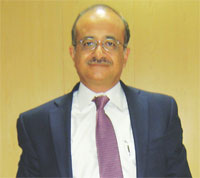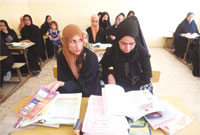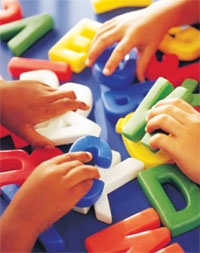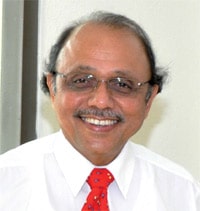The Shiv Nadar University aims to create a centre of excellence in higher education, which will be at par with premier education institutions across the world. Dr Nikhil Sinha, Founding Vice Chancellor, Shiv Nadar University, in an interaction with Dr Rajeshree Dutta Kumar and Pragya Gupta, shared his perspective on higher education in India. Excerpts:

http://snu.edu.in/
Can you give us details about the genesis of Shiv Nadar University?
From the very beginning, our thought process has been into understanding the kind of education that can ‘deliver’ in 21st century in India. Till 2010, we were focusing on the type of university that we could build. Therefore, we visited the top educational institute of the world, not to duplicate their efforts, but to amalgamate best practices from global universities and to avoid pitfalls.
Our University seeks to be a world-class institute, which would compete on merit with premier institutions of the world. The country needs many such institutes to cater to the large base of graduates and students passing out of school each year. Although India can be justifiably proud of having a robust education infrastructure, it has not uniformly kept in tune with the current Indian and global needs in higher education. Students who join Shiv Nadar University would not be the ones who are trying to win a rat race. We will not be churning out white collared workers for corporate houses. Students who come here will have a quest for knowledge, research and training.
How does the University plan its outreach in the coming years?
We are going to set up a research-led multidisciplinary university in Uttar Pradesh, which will offer courses in engineering, social sciences, natural sciences, schools of business and other professional courses in due time. We will start admissions from this academic session itself and the total intake this year would be around 200-300 students. At the Shiv Nadar foundation, we have already brought social transformation into education.
In addition, we have another emerging project of open school targeting a large number of urban students. We have a number of universities in India at every stretch but most of them do not meet global standards, which is a crucial requirement in today’s higher education scenario. Many institutes have come up in Noida, which offers good education, and where students can hope to be placed in good jobs after their studies. Several institutions like Amity and the India Institute of Planning and Management have now started establishing branches in tier-II cities, thereby providing good faculty and placements, which is helpful in meeting the increasing demand among students for quality education.
Shiv Nadar University treats knowledge in a holistic manner and creates opportunities for different kinds of interface between diverse disciplines. Could you tell us how this will be made effective?
Everybody is talking about interdisciplinary education, but we find that hardly anybody is replicating it in their teaching and learning methods, because in most of the Universities, their faculty is established and you can’t force them in to this practice. There are issues, which we have already seen and we are trying to implement it in our universities. Bringing research in under graduate curriculum is another important focus for us. Early this year, we had two workshops in India with participation from eminent people from academia and industry from all over the world.
According to you, what are the essential pillars in education? What partnerships are there in your agenda?
We think there are three essential pillars in education. First is research focus encompassing all- engineering and humanities subjects. We believe that research should be focused in all frontiers of knowledge. Secondly, academics being multi disciplinary and inter disciplinary is another important element for us. Delhi University is the best example of this. The design of curriculum must be interdisciplinary. We are going to launch our partnership with Mathematical Foundation. It is based on Mathematics in Information Technology.
This reiterates our commitment to transform the way education is delivered in the country. Education should be participatory and engaging and also help ignite young minds by linking it to research and innovation and also to the needs of society. Similarly, nano technology is an essential part of all streams of science and technology. We are going to establish an institute in nano technology. Similarly, in psychology, the same concept is equally significant.
The third pillar is new for India which revolves around the undergraduate programmes but globally it is already implemented. It is based on innovative under graduate programmes. We believe that there is a core set of knowledge, i.e., every student graduating from Shiv Nadar University must have core competency knowledge and it will cover basic concepts of all streams. There is a core common set of knowledge that covers social science, mathematics and other core curriculum.
We feel that 17 and 18 year old students must be given an opportunity to energise and should be allowed to test their ability in different disciplines and they should not be forced into taking up any particular discipline. Another element that they must have are interdisciplinary skills.
How has globalisation affected the scenario of education? Is there any need of interaction with global academia for the students in the changing scenario?
In a globalised world, nobody can afford to ignore global developments. We are building partnerships with the leading universities of the world. In today’s world, learning cannot be confined to the class room teachings, therefore, students should take up internships. They have to go out in the field and interact. It will enable engineering students to dabble in communication studies when they wish to, and Business Management graduates to discover the joys of liberal arts. It’s the sort of eclectic, egalitarian mix which you would find only in educational institutes abroad. The Shiv Nadar University brings those choices, right up to your doorstep.
 Finding the right faculty is a big challenge. We are looking for people who want to do things differently
Finding the right faculty is a big challenge. We are looking for people who want to do things differently
What are the micro and macro challenges in terms of faculty hiring?
Finding the right faculty is a big challenge. We are looking for people who want to do things differently. We have already begun the process of recruiting top class talents for both faculty and administration of the University. Our goal is to recruit exceptional faculty, from India and around the world, by offering them competitive benefits, opportunities and resources for research, option to the best and brightest students to teach and a commitment to academic freedom. Students will have the opportunity to be taught by outstanding faculty, to participate in research and experiential learning programs, to enhance their degree programs with international educational experiences and live and learn in a campus with world class infrastructure and facilities.
![]() The efforts of Sarva Shiksha Abhiyaan (SSA) are aimed at providing useful and relevant elementary education for all children in the age group of 6 to 14 years and to bridge social, regional and gender gaps, with the active participation of the community in the management of schools. In this article we focus on the educational efforts of Goa and explore the diverse range of activities being undertaken in the State under SSA
The efforts of Sarva Shiksha Abhiyaan (SSA) are aimed at providing useful and relevant elementary education for all children in the age group of 6 to 14 years and to bridge social, regional and gender gaps, with the active participation of the community in the management of schools. In this article we focus on the educational efforts of Goa and explore the diverse range of activities being undertaken in the State under SSA









 Trained teachers for helping students with Speech and Language disability are now in short supply due to retirements in Schools in La Crosse, USA. The school authorities have been finding it more and more complicated to locate trained teachers to assist students, more than 32,000 other Wisconsin children, who have a primary speech-language disability. There are about 1,900 speech-language pathologistsare working in Wisconsin schools, about one for every 16 children with a speech disability.
Trained teachers for helping students with Speech and Language disability are now in short supply due to retirements in Schools in La Crosse, USA. The school authorities have been finding it more and more complicated to locate trained teachers to assist students, more than 32,000 other Wisconsin children, who have a primary speech-language disability. There are about 1,900 speech-language pathologistsare working in Wisconsin schools, about one for every 16 children with a speech disability. A literacy and life skills training programme for 6,000 unemployed youth and women in Iraq has been launched by UNESCO. The grant programme, funded by the Office of Her Highness Sheikha Moza bint Nasser, First Lady of Qatar, UNESCO's special Envoy for Basic and Higher Education, is part of the Literacy Initiative for Empowerment (LIFE) project in Iraq which aims to achieve the Education for All (EFA) goal of reducing illiteracy by 50 per cent by 2015. The programme will help 25 local non-governmental organizations (NGOs) and the Iraqi education ministry to establish community learning centres throughout the country.
A literacy and life skills training programme for 6,000 unemployed youth and women in Iraq has been launched by UNESCO. The grant programme, funded by the Office of Her Highness Sheikha Moza bint Nasser, First Lady of Qatar, UNESCO's special Envoy for Basic and Higher Education, is part of the Literacy Initiative for Empowerment (LIFE) project in Iraq which aims to achieve the Education for All (EFA) goal of reducing illiteracy by 50 per cent by 2015. The programme will help 25 local non-governmental organizations (NGOs) and the Iraqi education ministry to establish community learning centres throughout the country.  Thousands of high-school students will have one less year to study business, biotech, engineering, multimedia, refrigeration repair and dozens of other career and technical-education subjects after state lawmakers cut $30 million from a statewide program. The classes are part of the Joint Technological Education District, which offers vocational education through central and satellite programs in the state.
Thousands of high-school students will have one less year to study business, biotech, engineering, multimedia, refrigeration repair and dozens of other career and technical-education subjects after state lawmakers cut $30 million from a statewide program. The classes are part of the Joint Technological Education District, which offers vocational education through central and satellite programs in the state. Many of Midland ISD's early childhood classes won't be complete when classes start for the coming semester, although registration for early childhood programs began in April. The district has received more than 200 applications for the program since Aug. 1 and has been unable to complete processing.
Many of Midland ISD's early childhood classes won't be complete when classes start for the coming semester, although registration for early childhood programs began in April. The district has received more than 200 applications for the program since Aug. 1 and has been unable to complete processing. Education experts called for scrutiny of this year's A-level results as figures revealed the number of Welsh students being accepted into university has fallen. Figures released by the Universities and Colleges Admissions Service (Ucas) to the Western Mail showed there were 159 fewer Welsh students accepted into university this year than at the same time last year.
Education experts called for scrutiny of this year's A-level results as figures revealed the number of Welsh students being accepted into university has fallen. Figures released by the Universities and Colleges Admissions Service (Ucas) to the Western Mail showed there were 159 fewer Welsh students accepted into university this year than at the same time last year.

 Finding the right faculty is a big challenge. We are looking for people who want to do things differently
Finding the right faculty is a big challenge. We are looking for people who want to do things differently
 Meena Ganesh
Meena Ganesh
 Dr K Ramnarayan,Vice-Chancellor,Manipal University
Dr K Ramnarayan,Vice-Chancellor,Manipal University








